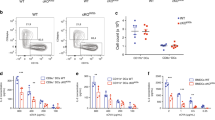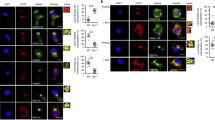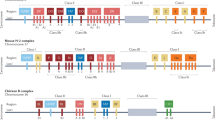Abstract
In order for cytotoxic T cells to initiate immune responses, peptides derived from internalized antigens must be presented to the cytotoxic T cells on major histocompatibility complex (MHC) class I molecules. Here we show that dendritic cells, the only antigen-presenting cells that initiate immune responses efficiently, have developed a unique membrane transport pathway linking the lumen of endocytic compartments and the cytosol. Endosome-to-cytosol transport is restricted to dendritic cells, specific to internalized antigens and selective for the size of the transported molecules. Thus, in dendritic cells, internalized antigens gain access to the cytosolic antigen-processing machinery and to the conventional MHC class I antigen-presentation pathway.
This is a preview of subscription content, access via your institution
Access options
Subscribe to this journal
Receive 12 print issues and online access
$209.00 per year
only $17.42 per issue
Buy this article
- Purchase on Springer Link
- Instant access to full article PDF
Prices may be subject to local taxes which are calculated during checkout








Similar content being viewed by others
References
Pamer, E. & Cresswell, P. Mechanisms of MHC class I-restricted antigen processing. Annu. Rev. Immunol. 16, 323–358 (1998).
Watts, C. Capture and processing of exogenous antigens for presentation on MHC molecules . Annu. Rev. Immunol. 15, 821– 850 (1997).
Germain, R. N. et al. Processing and presentation of endocytically acquired protein antigens by MHC class II and class I molecules. Immunol. Rev. 151, 5–30 (1996).
Bevan, M. J. Cross-priming for a secondary cytotoxic response to minor H antigens with H-2 congenic cells which do not cross-react in the cytotoxic assay. J. Exp. Med. 143, 1283–1288 (1976).
Huang, A. Y. et al. Role of bone marrow-derived cells in presenting MHC class I-restricted tumor antigens. Science 264, 961–965 (1994).
Sigal, L., J., Crotty, S., Andino, R. & Rock, K. L. Cytotoxic T-cell immunity to virus-infected non-hematopoietic cells requires presentation of exogenous antigen. Nature 398, 77– 80 (1999).
Carbone, F. R., Kurts, C., Bennett, S. R., Miller, J. F. & Heath, W. R. Cross-presentation: a general mechanism for CTL immunity and tolerance. Immunol. Today 19, 368–373 (1998).
Huang, A. Y., Bruce, A. T., Pardoll, D. M. & Levitsky, H. I. In vivo cross-priming of MHC class I-restricted antigens requires the TAP transporter. Immunity 4, 349– 355 (1996).
Banchereau, J. & Steinman, R. M. Dendritic cells and the control of immunity. Nature 392, 245– 252 (1998).
Albert, M. L., Sauter, B. & Bhardwaj, N. Dendritic cells acquire antigen from apoptotic cells and induce class I-restricted CTLs. Nature 392, 86–89 (1998).
Regnault, A. et al. FcγR-mediated induction of dendritic cell maturation and MHC class I-restricted antigen presentation after immune complex internalization . J. Exp. Med. 189, 371– 380 (1999).
Norbury, C. C., Hewlett, L. J., Prescott, A. R., Shastri, N. & Watts, C. Class I MHC presentation of exogenous soluble antigen via macropinocytosis in bone marrow macrophages. Immunity 3, 783–791 ( 1995).
Norbury, C. C., Chambers, B. J., Prescott, A. R., Ljunggren, H. G. & Watts, C. Constitutive macropinocytosis allows TAP-dependent major histocompatibility complex class I presentation of exogenous soluble antigen by bone marrow-derived dendritic cells. Eur. J. Immunol. 27, 280–288 (1997).
Yewdell, J., Norbury, C. & Bennink, J. Mechanisms of exogenous antigen presentation by MHC class I molecules in vitro and in vivo: implications for generating CD8+ T cell responses to infectious agents, tumors, transplants and vaccines . Adv. Immunol. (in the press).
Winzler, C. et al. Maturation stages of mouse dendritic cells in growth factor-dependent long-term cultures. J. Exp. Med. 185, 317 –328 (1997).
Shastri, N. & Gonzalez, F. Endogenous generation and presentation of the ovalbumin peptide/Kb complex to T cells. J. Immunol. 150, 2724–2736 (1993).
Fenteany, G. et al. Inhibition of proteasome activities and subunit-specific amino-terminal threonine modification by lactacystin. Science 268, 726–731 (1995).
Kovacsovics-Bankowski, M., Clark, K., Benacerraf, B. & Rock, K. L. Efficient major histocompatibility complex class I presentation of exogenous antigen upon phagocytosis by macrophages. Proc. Natl Acad. Sci. USA 90, 4942–4946 ( 1993).
Shen, Z., Reznikoff, G., Dranoff, G. & Rock, K. L. Cloned dendritic cells can present exogenous antigens on both MHC class I and class II molecules. J. Immunol. 158, 2723–2730 (1997).
Mitchell, D. A., Nair, S. K. & Gilboa, E. Dendritic cell/macrophage precursors capture exogenous antigen for MHC class I presentation by dendritic cells. Eur. J. Immunol. 28, 1923–1933 ( 1998).
Moore, M. W., Carbone, F. R. & Bevan, M. J. Introduction of soluble protein into the class I pathway of antigen processing and presentation. Cell 54, 777–785 (1988).
Kovacsovics-Bankowski, M. & Rock, K. L. A phagosome-to-cytosol pathway for exogenous antigens presented on MHC class I molecules. Science 267, 243–246 ( 1995).
Reis e Sousa, C. & Germain, R. N. Major histocompatibility complex class I presentation of peptides derived from soluble exogenous antigen by a subset of cells engaged in phagocytosis. J. Exp. Med. 182, 841–851 (1995).
Oh, Y. K., Harding, C. V. & Swanson, J. A. The efficiency of antigen delivery from macrophage phagosomes into cytoplasm for MHC class I-restricted antigen presentation . Vaccine 15, 511–518 (1997).
Bachmann, M. F. et al. Dendritic cells process exogenous viral proteins and virus-like particles for class I presentation to CD8+ cytotoxic T lymphocytes. Eur. J. Immunol. 26, 2595–2600 (1996).
Rescigno, M. et al. Bacteria-induced neo-biosynthesis, stabilization, and surface expression of functional class I molecules in mouse dendritic cells. Proc. Natl Acad. Sci. USA 95, 5229– 5234 (1998).
Prina, E., Lang, T., Glaichenhaus, N. & Antoine, J.-C. Presentation of the protective parasite antigen LACK by Leishmania-infected macrophages. J. Immunol. 156, 4318– 4327 (1996).
Sanderson, S. & Shastri, N. LacZ inducible, antigen/MHC-specific T cell hybrids. Int. Immunol. 6, 369– 376 (1994).
Raposo, G., Kleijmeer, M. J., Posthuma, G., Slot, J. W. & Geuze, H. J. in Weir’s Handbook of Exp. Immunol. 5th edn Vol. 4 Ch. 208 (eds Herzenberg, L. A., Weir, D., Herzenberg, L. A. & Blackwell, C.) 1–11 (Blackwell Science, Cambridge, MA, 1997).
Drake, J. R., Repasky, E. A. & Bankert, R. B. Endocytosis of antigen, anti-idiotype, and anti-immunoglobulin antibodies and receptor re-expression by murine B cells. J. Immunol. 143, 1768–1776 ( 1989).
Green, S. A., Zimmer, K. P., Griffiths, G. & Mellman, I. Kinetics of intracellular transport and sorting of lysosomal membrane and plasma membrane proteins. J. Cell Biol. 105, 1227–1240 (1987).
Rodriguez, A., Webster, P., Ortego, J. & Andrews, N. W. Lysosomes behave as Ca2+-regulated exocytic vesicles in fibroblasts and epithelial cells. J. Cell Biol. 137, 93– 104 (1997).
Press, B., Feng, Y., Hoflack, B. & Wandinger-Ness, A. Mutant Rab7 causes the accumulation of cathepsin D and cation-independent mannose 6-phosphate receptor in an early endocytic compartment. J. Cell Biol. 140, 1075–1089 ( 1998).
Acknowledgements
We thank J.C. Antoine for providing macrophages, L. Cabanié for chromatography analysis, A. Trautman for advice on the T-cell Ca2+-activation experiments, M. Albert, P. Benaroch, and P. Pereira for helpful discussions and comments on the manuscript, W. Faigle for his help with Adobe Photoshop, J. M. Griffith for preparation of ultrathin cryosections, and R. Scriwaneck and D. Morineau for photographic work.
Correspondence and requests for materials should be addressed to S.A.
Author information
Authors and Affiliations
Rights and permissions
About this article
Cite this article
Rodriguez, A., Regnault, A., Kleijmeer, M. et al. Selective transport of internalized antigens to the cytosol for MHC class I presentation in dendritic cells. Nat Cell Biol 1, 362–368 (1999). https://doi.org/10.1038/14058
Received:
Revised:
Accepted:
Published:
Issue Date:
DOI: https://doi.org/10.1038/14058
This article is cited by
-
Increased cross-presentation by dendritic cells and enhanced anti-tumour therapy using the Arp2/3 inhibitor CK666
British Journal of Cancer (2023)
-
A nanoparticle vaccine that targets neoantigen peptides to lymphoid tissues elicits robust antitumor T cell responses
npj Vaccines (2020)
-
A general strategy towards personalized nanovaccines based on fluoropolymers for post-surgical cancer immunotherapy
Nature Nanotechnology (2020)
-
Dying cells actively regulate adaptive immune responses
Nature Reviews Immunology (2017)
-
Langerin-mediated internalization of a modified peptide routes antigens to early endosomes and enhances cross-presentation by human Langerhans cells
Cellular & Molecular Immunology (2017)



